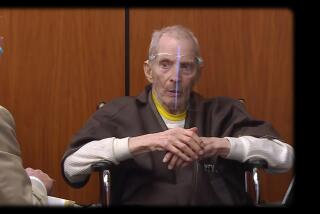Robert D. Chatterton, 66; Lawyer Whose Depression Halted ’92 Trial
- Share via
Robert D. Chatterton, a top Orange County prosecutor and criminal defense attorney for 30 years whose high-profile career was derailed for a brief period in the 1990s after a highly publicized bout with depression that halted a sensational murder trial, died April 18 at a Mission Viejo hospital. He was 66.
The cause was pancreatic cancer, according to attorney John York, a longtime colleague.
Chatterton, a former police officer, built a reputation as a formidable prosecutor -- known for his exhaustive trial preparation -- during 12 years with the Orange County district attorney’s office from 1969 to 1981. He also founded and supervised the D.A.’s first homicide unit to work closely with investigators.
In one of his most notable cases, Chatterton prosecuted physician William Waddill in a 1979 case that alleged Waddill had killed a fetus delivered after an unsuccessful abortion on an 18-year-old high school student.
An emotional case that stoked debate on both sides of the abortion issue, it eventually was dismissed after two trials ended in hung juries. But Chatterton never wavered in his belief that the doctor had been obligated to save the fetus, even if it was unwanted by the mother and badly injured by the abortion.
Chatterton entered private practice in 1981 and defended a number of notorious clients, including Richard Overton, a Dana Point man accused in 1988 of the cyanide poisoning of his wife, Janet, a popular Capistrano Unified School District board member. It became one of Orange County’s most bizarre and protracted murder cases.
The trial, which took place in 1992, was abruptly halted after 30 days of testimony because of a dispute between Overton and Chatterton about the truthfulness of Overton’s statements on the witness stand about a certain piece of evidence. Overton suffered an anxiety attack in court and had to be wheeled out on a gurney.
A few weeks later, Chatterton, exhausted after 20,000 pages of discovery and a year of six-day workweeks to prepare for the trial, suffered a paralyzing breakdown.
“I virtually couldn’t get out of my seat in the courtroom,” he told the Orange County Register in 1994. “I was going through token words just because I was quite overwhelmed at the inability to do anything.”
He voluntarily entered a psychiatric hospital, where he was diagnosed with severe depression. The trial was suspended, and his illness was withheld from the public for several months while he recuperated.
During his recovery, Chatterton learned that he had a genetic predisposition to depression. His father, DeWitte Chatterton, a prominent Orange County prosecutor in the 1950s and 1960s, had suffered from manic-depressive disorder.
Chatterton learned to control his illness with antidepressants and recovered fully, but a mistrial was declared in 1993, in part because of Chatterton’s long absence and also because of Overton’s false testimony about evidence. Overton was convicted at retrial in 1995 and given a life sentence.
Chatterton later said his practice was nearly ruined by media reports about his illness. He said he would have gone bankrupt without intermittent court appointments to cases.
He rebuilt his practice and eventually had more work than he could handle, according to York, who shared office space with Chatterton for 25 years. “His niche was the courtroom,” York said. “He was one of the finest criminal defense attorneys the county ever had.”
Chatterton continued to try cases until heart attacks in 1998 and 2000 left him greatly weakened. He was diagnosed with pancreatic cancer in March.
A native of Ann Arbor, Mich., who grew up in Orange County, Chatterton earned a bachelor’s degree from UCLA in 1965 and a law degree from Loyola Marymount in 1968.
Twice divorced, he is survived by sons Rob and Cort and two grandchildren.
More to Read
Sign up for Essential California
The most important California stories and recommendations in your inbox every morning.
You may occasionally receive promotional content from the Los Angeles Times.














